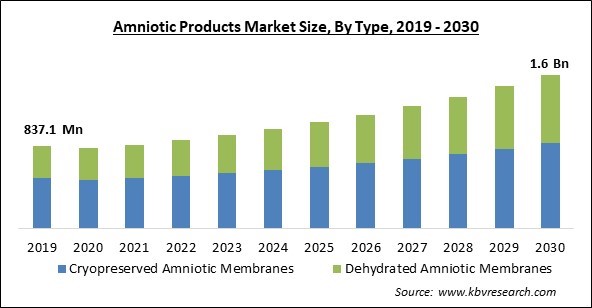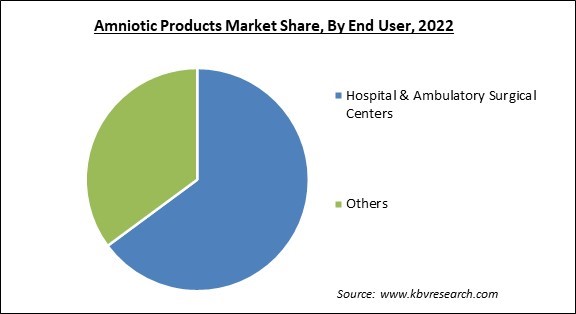The Global Amniotic Products Market size is expected to reach $1.6 billion by 2030, rising at a market growth of 7.4% CAGR during the forecast period.
Diabetes slows wound healing, hence amniotic membranes and other sophisticated wound care products are required for treatment. Therefore, wound care segment would generate more than 40% share of the market by 2030. For example, diabetes and obesity can lead to a rise in ulcerations, such as leg or foot ulcers, requiring wound care and resulting in astronomical medical costs. According to the IDF 2021, 1 in 10 adults (aged 20 to 79) have diabetes. By 2030 and 2045, this number is projected to increase to 643 million and 783 million, respectively. Diabetes's severe consequences include diabetic foot ulcers. Consequently, the growing prevalence of diabetes will increase demand for wound care products. Some of the factors impacting the market are increasing number of burn injuries, growing interest and investment, and amniotic membrane products have a high price.

The WHO reports that most burn cases happen in low- and middle-income countries, with roughly two-thirds occurring in the WHO regions of Africa and Southeast Asia. The demand for these tissue-based solutions has also increased due to the rise in transplants that have occurred in recent years due to increased awareness. Additionally, several donations have seen a rise in awareness, fueling the market's revenue expansion. The rise in the geriatric population worldwide and the consequent rise in ophthalmology surgery have created a sizable demand for these tissue-based products. During the projection period, it is anticipated that actions such as increasing investments, a rise in partnerships and collaborations, and innovative product development strategies would support market expansion. As a result of the increasing interest and investment, the market will grow automatically.
However, Amniotic products must be processed and manufactured using specialized techniques to preserve their biological qualities and ensure their safety. The production cost may rise due to the considerable quality control, testing, and regulatory compliance involved in these procedures. As the prices of amniotic membrane products is high and the reimbursement scenario is poor, the market is estimated to witness slow growth.
The amniotic product market suffered in 2020 due to the COVID-19 outbreak's widespread lockdowns, refusal of wound care services, and cancellation or postponement of elective procedures. Elective operations were rejected (cancelled/postponed) to reserve or redistribute the limited capabilities and resources (such as hospital beds and patient care specialists) toward COVID-19 patient care. These lockdowns restricted patients from entering clinics, hospitals, or OPDs. This temporary restriction of non-emergent healthcare services is anticipated to limit the market growth. However, demand for amniotic products is anticipated to grow over the coming years.
By type, the market is classified into cryopreserved amniotic membrane and dehydrated amniotic membrane. In 2022, the cryopreserved amniotic membrane segment held the highest revenue share in the market. The cryopreserved membrane is typically retained at -80 °C in a cell culture medium containing 50% glycerol. The amniotic membrane's histological and biological characteristics are well-preserved in cryopreserved amniotic membranes. Consequently, cryopreserved membranes are primarily used in eye operations to reduce inflammation and improve recovery. As a result, this market is predicted to expand at a profitable pace over the forecast period.
Based on end user, the market is categorized into hospitals & ambulatory surgical centers and other end users. In 2022, the hospitals segment dominated the market with maximum revenue share. The increasing use of amniotic membranes in ASCs is another element that should accelerate market expansion. Using these items is simple and efficient, and it also helps the wound heal without frequent trips to clinics or hospitals. As hospitals are the primary care environments that facilitate simple treatment for a wide range of diseases, this is primarily owing to frequent visits by patients. This encourages the segment’s expansion.

On the basis of application, the market is bifurcated into wound care, orthopedics, ophthalmology, and other applications. In 2022, the ophthalmology segment covered a considerable revenue share in the market. It is due to various product developments and discoveries from regenerative medicine research that would enable improved utilization of amniotic membranes in the abovementioned segment. Further, the segment’s growth is driven by the rising incidence of ophthalmologic conditions globally.
| Report Attribute | Details |
|---|---|
| Market size value in 2022 | USD 894.4 Million |
| Market size forecast in 2030 | USD 1.6 Billion |
| Base Year | 2022 |
| Historical Period | 2019 to 2021 |
| Forecast Period | 2023 to 2030 |
| Revenue Growth Rate | CAGR of 7.4% from 2023 to 2030 |
| Number of Pages | 216 |
| Number of Table | 339 |
| Report coverage | Market Trends, Revenue Estimation and Forecast, Segmentation Analysis, Regional and Country Breakdown, Companies Strategic Developments, Company Profiling |
| Segments covered | Type, Application, End Use, Region |
| Country scope | US, Canada, Mexico, Germany, UK, France, Russia, Spain, Italy, China, Japan, India, South Korea, Singapore, Malaysia, Brazil, Argentina, UAE, Saudi Arabia, South Africa, Nigeria |
| Growth Drivers |
|
| Restraints |
|
Region wise, the market analyzed across North America, Europe, Asia Pacific and LAMEA. In 2022, the North America region led the market by generating the highest revenue share. The high incidence of chronic wounds and diabetes, the rising cost of healthcare, the rise in the number of surgical operations performed in the US are propelling the regional market’s growth. Further, the rising geriatric population, and the significant presence of amniotic product manufacturers all contribute to the market's expansion.
Free Valuable Insights: Global Amniotic Products Market size to reach USD 1.6 Billion by 2030
The market research report covers the analysis of key stake holders of the market. Key companies profiled in the report include MiMedx Group, Inc., Integra LifeSciences Holdings Corporation, Organogenesis Holdings, Inc., Amnio technology LLC, Alliqua Biomedical, Inc., Human Regenerative Technologies, LLC (Skye Biologics Holdings Company), Corza Ophthalmology (Corza Medical, Inc.), BioTissue Holdings, Inc., Applied Biologics LLC
By Type
By Application
By End User
By Geography
The Market size is projected to reach USD 1.6 billion by 2030.
Growing Interest and Investment are driving the Market in coming years, however, Amniotic membrane products have a high price restraints the growth of the Market.
MiMedx Group, Inc., Integra LifeSciences Holdings Corporation, Organogenesis Holdings, Inc., Amnio technology LLC, Alliqua Biomedical, Inc., Human Regenerative Technologies, LLC (Skye Biologics Holdings Company), Corza Ophthalmology (Corza Medical, Inc.), BioTissue Holdings, Inc., Applied Biologics LLC
The Wound Care segment is leading the Market by Application in 2022; thereby, achieving a market value of $601.1 Million by 2030.
The North America region dominated the Global Amniotic Products Market by Region in 2022, and would continue to be a dominant market till 2030; thereby, achieving a market value of $664 Million by 2030.
Our team of dedicated experts can provide you with attractive expansion opportunities for your business.

